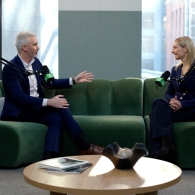
Get to know the new, More Human TD brand
To launch its reimagined brand, TD kicked off with an innovative ad, emphasizing that even as banking becomes more digital, the experience must remain fundamentally human




Trending

Take control of your finances.

Reimagine your banking experience.

Meet our people.

Opening doors to a brighter tomorrow.

Explore new perspectives.



